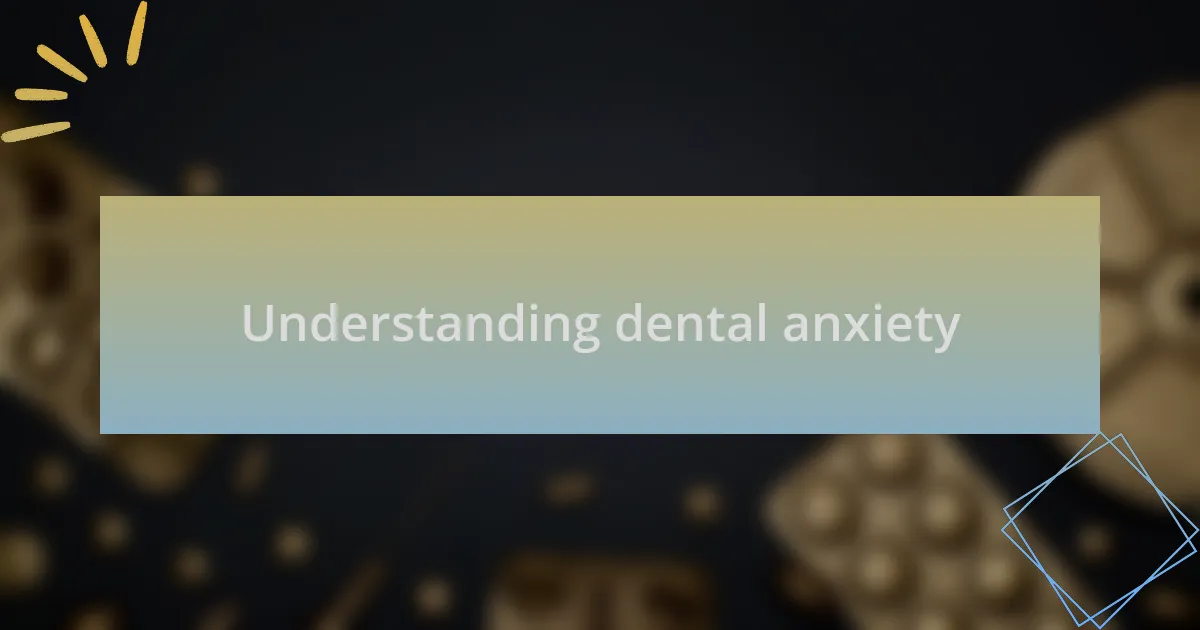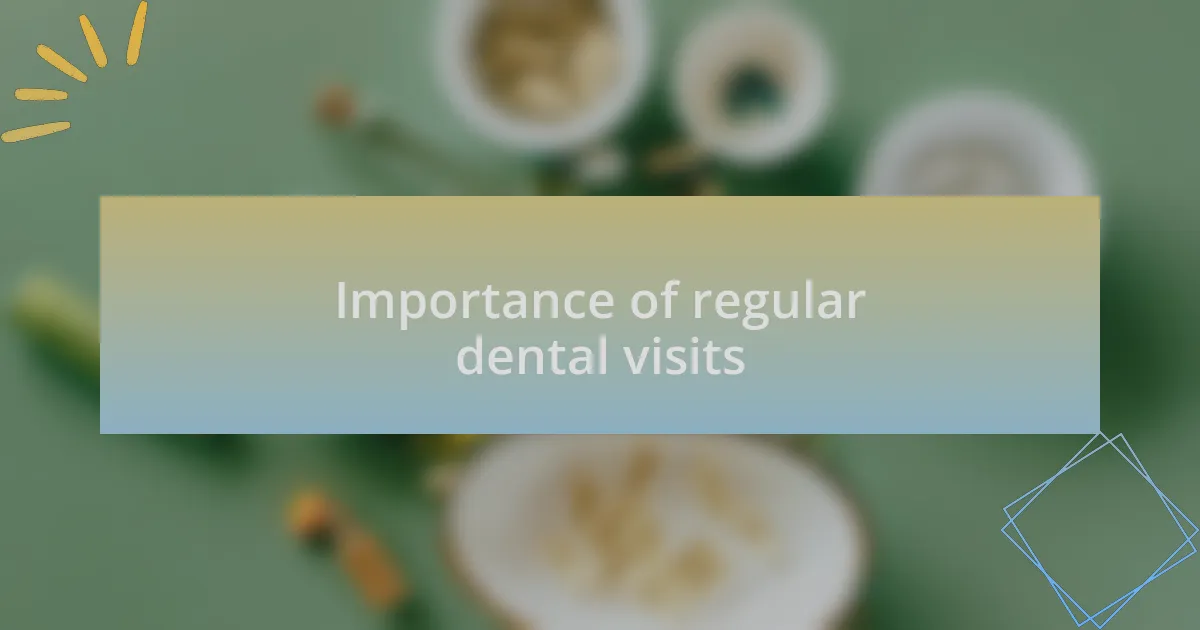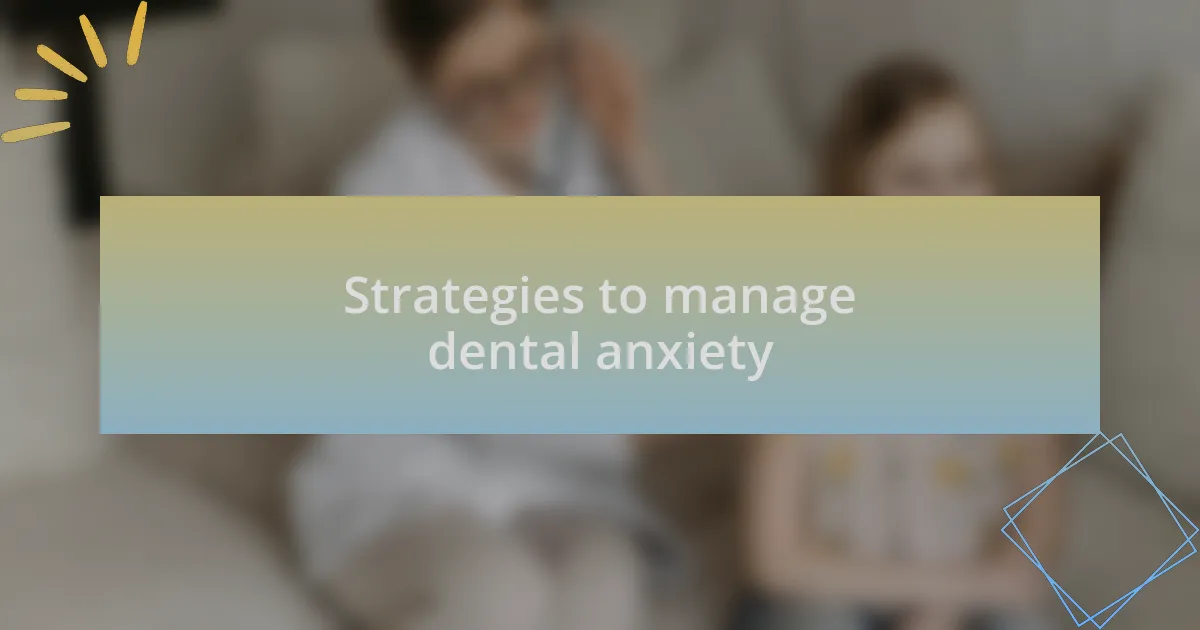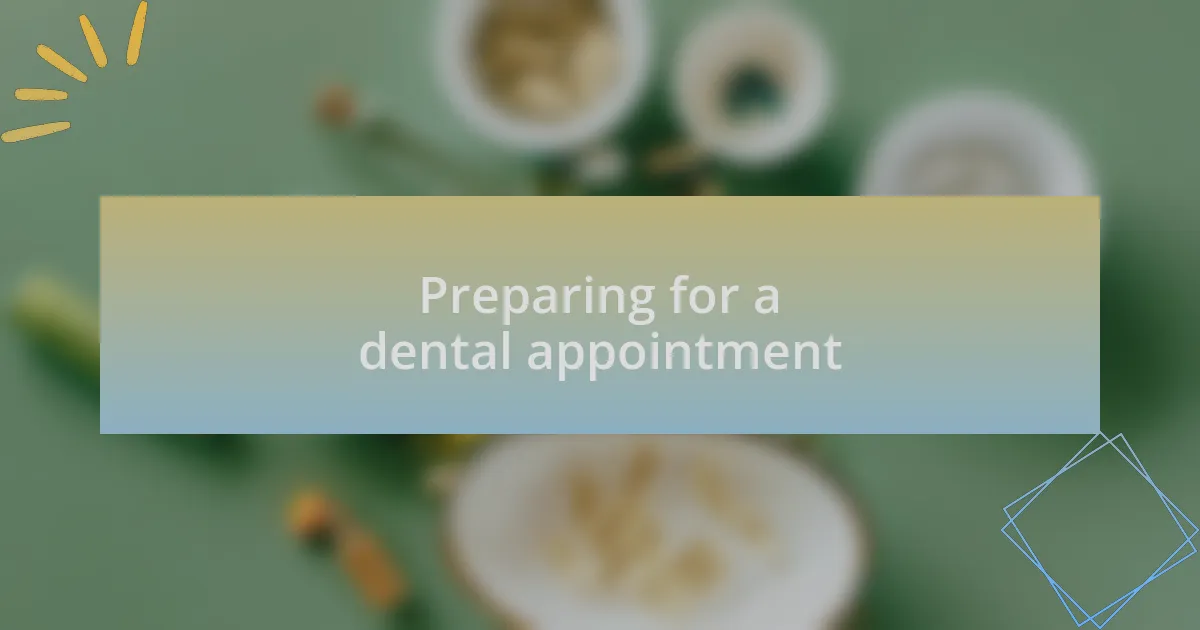Key takeaways:
- Dental anxiety often stems from past experiences and can be exacerbated by the clinical environment of dental offices.
- Regular dental visits are essential for both oral health and building a supportive relationship with your dentist, helping to alleviate anxiety.
- Effective strategies to manage dental anxiety include bringing a support person, practicing deep breathing, and visualizing calming scenes.
- Preparation for appointments—such as writing down questions or familiarizing with the clinic—can significantly reduce feelings of stress and uncertainty.

Understanding dental anxiety
Dental anxiety is more common than many people realize, often stemming from past experiences or even the sights and sounds associated with dental work. I remember vividly the first time I stepped into a dentist’s office; the smell of antiseptic and the whirring of drills made my heart race. It’s easy to wonder: why do so many of us let this fear dictate our choices?
Understanding dental anxiety requires us to explore its roots—sometimes, it’s a childhood experience that lingers into adulthood. I once spoke to a friend who avoided the dentist for years after a painful visit as a child. Listening to her story made me appreciate how deeply these fears can take hold, and it begs the question: how can we break this cycle?
It’s also essential to acknowledge that our fears often feed on uncertainty and lack of control. For me, learning more about dental procedures transformed my perspective. I still recall reading about what to expect during treatment and realizing that knowledge is empowering. Isn’t it fascinating how information can reshape our fears into manageable thoughts?

Common causes of dental fear
Many people experience dental fear due to past negative experiences, which often become vivid memories that shape their perceptions. I once had a particularly traumatic filling done without adequate numbing, and even years later, the mere thought of returning to the dentist induced a wave of anxiety. Isn’t it interesting how a single moment can echo through our lives, affecting our choices?
Another common cause of dental fear is the anticipation of pain or discomfort. I remember dreading that sharp prick of the needle, convinced that it would be far worse than my imagination could conjure. It’s natural to wonder: how can we change our mindset to reassure ourselves about these situations? Often, speaking openly with the dentist about concerns can significantly mitigate these fears.
Lastly, the dental environment plays a pivotal role in contributing to anxiety. Those stark white walls and the clinical atmosphere can be intimidating. When I finally found a dentist who created a warm, welcoming space, it was a game-changer. Have you ever noticed how different surroundings can influence your feelings? For me, that inviting environment helped me feel more comfortable and even turned a dreaded appointment into a more positive experience.

Importance of regular dental visits
Regular dental visits are crucial for maintaining not just oral health, but overall well-being. I remember the first time I skipped my appointment—what seemed like a harmless decision led to a cavity that required a painful filling later on. It made me realize the importance of addressing small issues before they escalate.
Preventive care is one of the primary benefits of consistent dental check-ups. I’ve learned that routine cleanings help catch problems early, like gum disease or tooth decay, which often go unnoticed. Have you ever thought about how much easier it is to address issues when they’re small? Trust me, it’s far better to deal with minor maintenance than to face more significant, nerve-wracking procedures down the line.
Moreover, regular visits build a rapport with your dentist, easing anxiety about future appointments. When I began to see my dentist not just as a healthcare provider but as a partner in my health, the dread dissipated. Isn’t it empowering to have someone who understands your fears and works with you to create a comfortable experience? This relationship makes every visit feel less intimidating and more like an essential part of my health routine.

Strategies to manage dental anxiety
One effective strategy I’ve found in managing dental anxiety is bringing a friend or family member to my appointments. I remember a particularly daunting visit when my sister came along; her presence turned what could have been a nerve-wracking experience into a more relaxed one. Sharing a smile, joking about our dental fears, made such a difference—have you ever tried this? It’s amazing how much support can help ease those jitters.
Practicing deep breathing techniques can also be incredibly beneficial. Before my dental visits, I started taking moments to focus on my breath—taking a few deep inhales and slow exhales. This simple act calms my racing heart and shifts my focus from the anxiety to the present moment. I often ask myself, “What’s the worst that could happen right now?” Realizing that it’s just a dental check-up really helps put things in perspective.
Visualizing a calm and peaceful place has also become a go-to technique for me. During those few moments in the dental chair, I close my eyes and imagine sitting by a serene lake, the sound of gentle waves lapping at the shore. This mental escape transports me away from the dental tools and bright lights. Have you ever thought about how powerful visualization can be? It truly works wonders in shifting my mindset from fear to tranquility.

Preparing for a dental appointment
Preparing for a dental appointment can often feel overwhelming, but I’ve learned that a little preparation goes a long way. One of my favorite things to do before heading to the clinic is to write down any questions or concerns I might have. I remember one appointment where I felt so uncertain about a procedure, but having my questions written down helped me feel more in control and empowered. Have you ever experienced that sense of clarity when you articulate your thoughts?
Another helpful tip is to familiarize myself with the clinic’s environment prior to my visit. I usually take a moment to look up the space online or even visit for a quick chat with the staff. I recall stepping into my dental clinic the first time and feeling this wave of anxiety wash over me because everything felt unfamiliar. Now, a brief visit or a friendly conversation with the receptionists can make me feel like I belong there, easing the anxiety before I even sit in the chair.
Lastly, I’ve learned that scheduling my appointments at a time when I feel the least rushed is vital. After a hectic day at work, the last thing I want is to add more stress by squeezing in a dental visit. I make it a point to select early morning slots when I’m fresh and more relaxed. Have you ever noticed how your mindset shifts when you’re not hurried? It’s a game changer!

Personal experiences with overcoming fear
Experiencing fear at the dental clinic was something I knew all too well. I distinctly remember my first encounter with a root canal; the mere thought sent shivers down my spine. To conquer that fear, I decided to shadow my friend during her visit, which allowed me to see firsthand the calm professionalism of the dentist and the care offered by the staff. Watching her relax under their gentle guidance made me reconsider my own apprehensions—could I be that relaxed too?
In another instance, I faced my anxiety head-on by confronting what I dreaded most: the dental chair. I packed a comforting item, my favorite stress ball, and took it with me to my next appointment. The moment I felt the tension rising, squeezing that ball reminded me to breathe and focus on something tangible. It’s amazing how a simple object can ground you in moments of uncertainty. Have you ever found comfort in an unexpected way?
Finally, I utilized visualizations to shift my mindset. Before my appointments, I began picturing myself in a peaceful place, far removed from the clinic. I imagined walking through a serene garden instead of sitting in the dental chair. This mental trick not only made me feel empowered but also shifted my perception of the experience itself. It made me wonder—could embracing imagination transform our fears into something manageable?